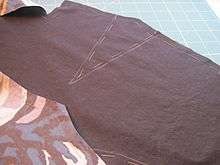Definify.com
Webster 1913 Edition
Baste
Baste
(bāst)
, Verb.
T.
[
imp. & p. p.
Basted
; p. pr. & vb. n.
Basting
.] [Cf. Icel.
beysta
to strike, powder; Sw. basa
to beat with a rod: perh. akin to E. beat
.] 1.
To beat with a stick; to cudgel.
One man was
basted
by the keeper for carrying some people over on his back through the waters. Pepys.
2.
(Cookery)
To sprinkle flour and salt and drip butter or fat on, as on meat in roasting.
3.
To mark with tar, as sheep.
[Prov. Eng.]
Baste
,Verb.
T.
[OE.
basten
, OF. bastir
, F. b[GREEK]tir
, prob. fr. OHG. bestan
to sew, MHG. besten
to bind, fr. OHG. bast
bast. See Bast
.] To sew loosely, or with long stitches; – usually, that the work may be held in position until sewed more firmly.
Shak.
Webster 1828 Edition
Baste
BASTE
,Verb.
T.
1.
To beat with a stick.2.
To drip butter or fat upon meat, as it turns upon the spit,in roasting; to moisten with fat or other liquid.BASTE
,Verb.
T.
Definition 2026
Baste
baste
baste
English
Verb

Basting material to a pattern before cutting it.
baste (third-person singular simple present bastes, present participle basting, simple past and past participle basted)
- To sew with long or loose stitches, as for temporary use, or in preparation for gathering the fabric.
Translations
To sew with long or loose stitches
Etymology 2
Unknown, possibly from Old French basser (“moisten, soak”).
Verb
baste (third-person singular simple present bastes, present participle basting, simple past and past participle basted)
- To sprinkle flour and salt and drip butter or fat on, as on meat in roasting.
- (by extension) To coat over something
- To mark (sheep, etc.) with tar.
Etymology 3
Perhaps from the cookery sense of baste or from some Scandinavian source. Compare Old Norse beysta (“to beat, thresh”) (whence Danish børste (“to beat up”)). Compare also Swedish basa (“to beat with a rod, to flog”) and Swedish bösta (“to thump”)
Verb
baste (third-person singular simple present bastes, present participle basting, simple past and past participle basted)
- (archaic, slang) To beat with a stick; to cudgel.
- Samuel Pepys
- One man was basted by the keeper for carrying some people over on his back through the waters.
- Samuel Pepys
Translations
(obsolete, slang) To beat with a stick
|
Anagrams
Northern Sami
Noun
baste
Inflection
| Even, st-stt gradation | ||
|---|---|---|
| Nominative | baste | |
| Genitive | bastte | |
| Singular | Plural | |
| Nominative | baste | basttet |
| Accusative | bastte | basttiid |
| Genitive | bastte | basttiid |
| Illative | bastii | basttiide |
| Locative | basttes | basttiin |
| Comitative | basttiin | basttiiguin |
| Essive | basten | |
| Possessive forms | |||
|---|---|---|---|
| Singular | Dual | Plural | |
| 1st person | basten | basteme | bastemet |
| 2nd person | bastet | bastede | bastedet |
| 3rd person | bastes | basteska | basteset |
Derived terms
Portuguese
Verb
baste
- first-person singular present subjunctive of bastar
- third-person singular present subjunctive of bastar
- third-person singular imperative of bastar
Spanish
Verb
baste